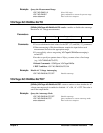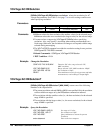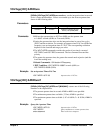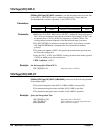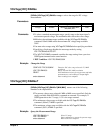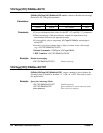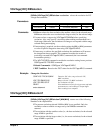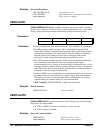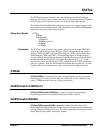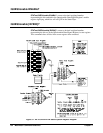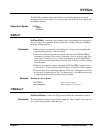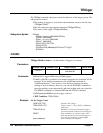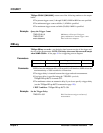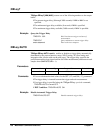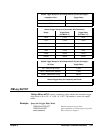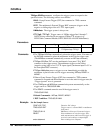
Multimeter Command Reference 153Chapter 3
STATus
The STATus subsystem reports the bit values of the Questionable Data/Signal
Register. It also allows you to unmask the bits you want reported from the Standard
Event Register and to read the summary bits from the Status Byte Register.
The Questionable Data/Signal Register group consists of a condition register, and
event register and an enable register. The commands in the
STATus:QUEStionable
subsystem control and monitor these registers.
Subsystem Syntax STATus
:PRESet
:QUEStionable
:CONDition?
:ENABle <
unmask>
:ENABle?
[:EVENt]?
Comments The STATus system contains seven registers, four of which are under IEEE 488.2
control: the Standard Event Status Register (
*ESR?), the Standard Event Enable
Register (
*ESE and *ESE?), the Status Byte Register (*STB?) and the Status Byte
Enable Register (
*SRE and *SRE?). The Operational Status bit (OPR), Request
Service bit (RQS), Standard Event summary bit (ESB), Message Available bit (MAV)
and Questionable Data bit (QUE) in the Status Byte Register (bits 7, 6, 5, 4 and 3
respectively) can be queried with the
*STB? command. Use the *ESE? command to
query the “unmask” value for the Standard Event Status Register (the bits you want
logically OR'd into the summary bit). Query using decimal weighted bit values.
:PRESet
STATus:PRESet command affects only the enable register by setting all enable
register bits to 0. It does not affect either the “status byte” or the “standard event
status”.
PRESet does not clear any of the event registers.
:QUEStionable:CONDition?
STATus:QUEStionable:CONDition? returns a decimal-weighted number
representing the bits set in the Questionable Data condition register.
:QUEStionable:ENABle
STATus:QUEStionable:ENABle <unmask> enables (unmasks) bits in the
Questionable Data/Signal Register's enable register to be reported to the summary bit
(setting Status Byte Register bit 3 true). The event register bits are not reported in the
Status Bytes Register unless specifically enabled.



